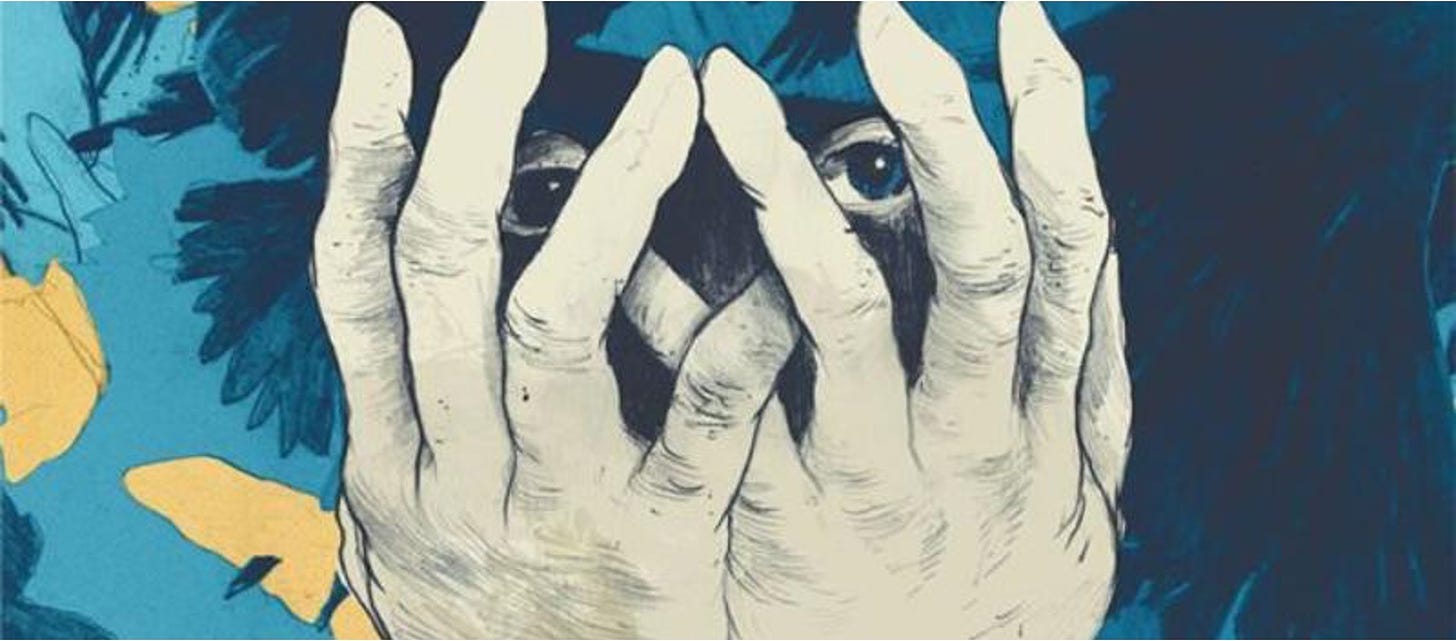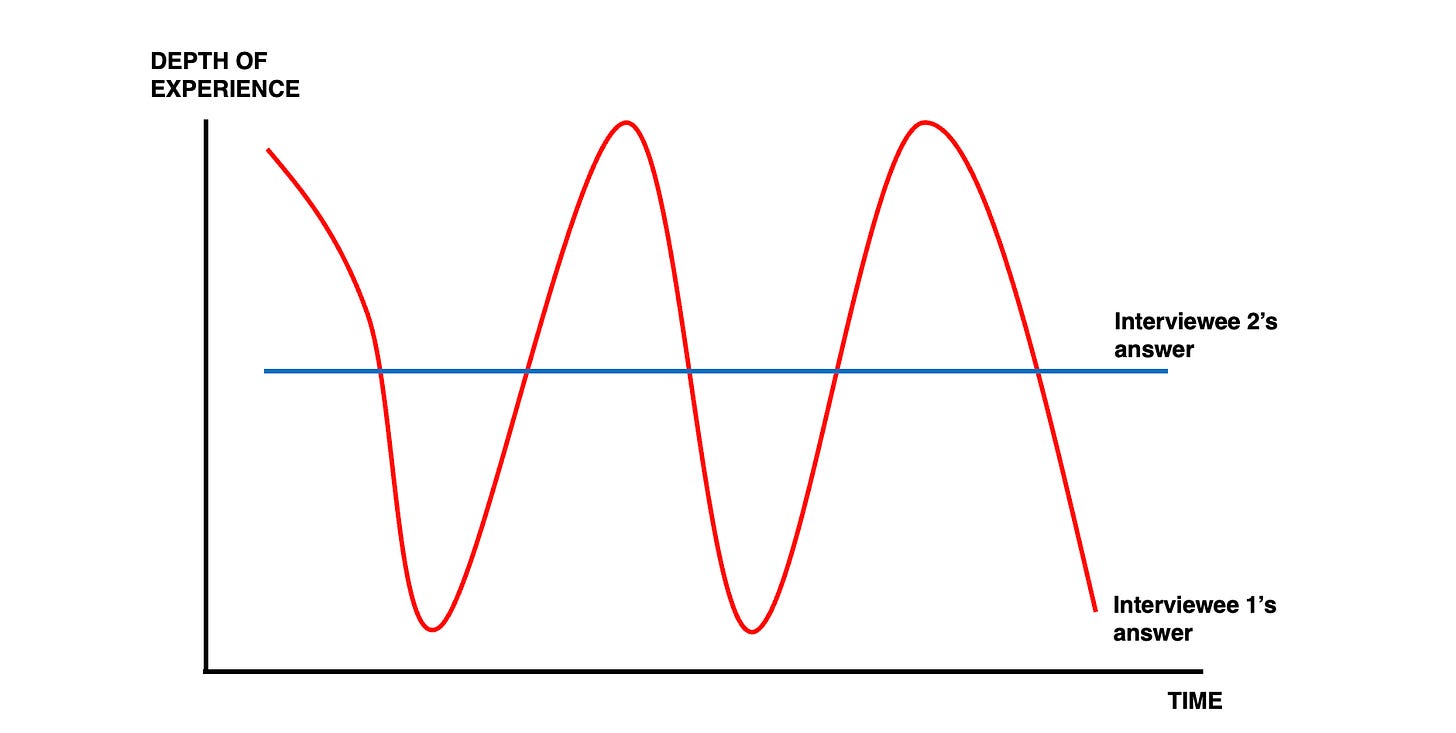Good day to you all,
I hope that you’re having a good time over the holidays, or if it’s a time of year that you don’t look forward to, that you’re navigating it as best you can.
This week is the final edition of the What is a Good Life? newsletter. I hope you’ve enjoyed this series and it has helped you in some way to formulate your own answer to the question.
I’d like to thank all the participants who took part in the original 110 interviews, and all who subscribed for your support and weekly personal messages.
There is no specific theme this week nor insight section. To finish off the series, I’ve included an interview with me around my thoughts on the project’s question.
After conducting the interviews, interviewees often asked me for my answer, so I thought this would be a fitting place to conclude the series. In this week’s reflection I discuss what I have learned from the project and what will come next.
1. This week’s interview
This week’s interview is with me.
What is a good life for you?
For me, a good life means having good health, good relationships - with my wife, family, and friends, exploring ideas and having big curiosities, and having enough belief and trust in myself to live how I want to live. It’s also having enough security so that how I chose to live my life doesn’t adversely affect somebody else’s.
I think much of how we interpret the external world is a projection of our own inner world dynamics. We merely paint those onto different canvasses and puppets. So, for me, a hugely important aspect of enjoying life comes from understanding more of myself. I really want to explore and understand more of myself and I think it’s important to periodically challenge my own assumptions and beliefs to see if they are still indeed true for me.
Can you talk to me about this idea of projecting our inner experience onto the world?
Yes. So when I observe my own reactions to the environment around me, whether that’s the behaviour of others, the news, etc., the world is never changing as quickly as my reactions to it.
What I decide to focus on, or what triggers me externally, has more to do with something inside of me than what is going on outside of me. There are always a plethora of positive and negative things that I can focus on at any given point, so when I become fixated with something negative in my external world, that is usually a cue for me to explore something within myself.
Recently, I’ve been getting a bit preoccupied with the hypocrisy I’m seeing in different facets of society. So inevitably I have to ask myself the question, what is presently hypocritical with how I’m showing up in the world? It’s not an exact science, nor is it all that easy to figure out, but it generally helps me.
Where does this curiosity to understand more about yourself stem from?
The curiosity began when I reached a point where I hardly knew myself anymore. I spent most of my twenties rarely admitting a fault or an insecurity, doubling down on arrogance, and that got me to a pretty unhealthy place in terms of understanding myself.
My initial steps included seeing a psychologist for around 7 or 8 months, and after that I kept pulling at a thread that continued to provide more questions and some answers. I started to view myself as somewhat of an experiment - seeing how I reacted to various 6 month breaks, for example from alcohol, dating, and watching sport.
At the same time I started to get more dedicated to my meditation, journalling, fasting, and reading about different philosophies (and sporadically locking myself in a dark room for 24hrs without food!). I wanted to find a part of me that was really me, if that makes sense? Not just behaviours I identified with.
Has this helped and what presently challenges you?
It’s certainly helped, but it’s not like life has become blissfully serene as a consequence of all this inquiry. One of the biggest challenges is maintaining consistency with all these practices, and the willingness to continue to explore. Recently I’ve felt a bit drained by my inquiries and am distracting myself too frequently with food and technology.
Another element is the short-term instability that some of these inquiries create. I’ve been trying not to have such fixed and absolute ideas in life, essentially trying not to control life so much. Over the last few years, it’s created periods of time when I don’t know which way is up, until a new understanding develops. This is a process that I’d like to find more consistency in.
This approach to life has given me a better understanding of who I am, which has developed far greater trust in myself, resulting in me making a lot more key life decisions with my intuition. From proposing very early in the relationship to my wife, to leaving a career behind, taking long sabbaticals, to moving countries. I am proud of the choices I’ve made, but in hindsight some more logic in planning these moves may have helped ease the transitions!
One of the biggest challenges I presently face is to continue to trust myself as I continue to navigate this path. Staying true to my own choices without getting distracted with comparisons with others or getting too fearful of the unknown ahead.
What has surprised you most about this journey so far?
How much we can deceive ourselves if we don’t pay attention to, and regularly question, our internal patterns of thought and internal dialogue.
Another one is the base case level of madness of the untrained mind (or maybe just my mind). The first Vipassana retreat I did (10 days of silence, with no access to tech, reading or writing material, where eye contact is prohibited), after the first 48 hours my anxiety was reaching fever pitch from repeatedly experiencing the same loops of thought that I couldn’t stop paying attention to that were making me suffer with no input from anyone else. The expression “the mind is a wonderful servant but a terrible master” comes to mind.
How in the end it’s not so much changing yourself, it’s more about changing your relationship with yourself. At the start of this trip, I was more concerned with denying and eliminating parts of me that I deemed to be undesirable or unlovable. This initially led me to becoming phoney in my pursuit of truth.
Ultimately, I see the challenge is more about accepting yourself as you are today, which ultimately gives you more freedom to be yourself, as opposed to resisting and fighting your way through your self-development. This practice still has big swings in my ability to do so.
Finally, when I started this process it bothered me that I didn’t feel fully alive nor was I all that aware of my feelings in general. Initially I was implementing these techniques to feel better, not to feel everything. In my experience, there’s a catch to frequently experiencing moments of euphoria and awe, and that’s I am also open to feeling the opposite more regularly too. Letting go of an attachment to a desired state is something that presently fascinates and challenges me.
“Knowing yourself is the beginning of all wisdom.” - Aristotle
2. This week’s reflection
What started off on a bit of a whim developed into a much bigger part of my life than expected - the weekly newsletter for 6 months, a corporate wellness program, and now a book that I am writing. When I started interviewing people I had little idea of what would become of it (which has brought home to me that simply starting is often the most important part of any journey).
One thing I wanted to demonstrate by interviewing so many people was that no two interviews were exactly alike. The shortest answer I got to the opening question was 32 words, the longest answer was over 1,900 words. One interviewee told me a good life entailed experiencing distinct highs and lows, while the very next interviewee told me that it was about keeping things in the middle.
I often see people who begin their own journey of self-development quickly latch onto somebody else’s ideas for a good life. While I understand the need for an immediate answer, it’s my personal opinion that we are all our own unique bundle of things in need of our own unique answer. Too many people abdicate themselves of the responsibility and vulnerability of finding, mapping, and following their own course.
I also wanted to show people that most of us are struggling with similar problems and challenges, despite appearances we are maintaining on the surface. I don’t feel I did this as well as I could have. I edited out too much of the process of how people came to their answers and potentially made some interviewees seem more coherent and sure than they were at times.
However, this process showed me that while some participants were overwhelmed with the question initially, they invariably navigated their way through the uncertainty and were ultimately far more capable than they initially thought, once they stuck with it. When I shared my edited versions of the interviews with the participants, I was frequently greeted with the sentiment of, “did I really say that?!” Our own internal wisdom is an untapped resource.
For me, this was the first time I’ve ever consistently published content in such a deliberate and consistent manner - a process that was sometimes fluid and enjoyable, and at other times frustrating and uncomfortable. I’m taking all I’ve learnt from this process into writing a book on the same theme, which I’ll provide updates on in the new year, as well as generating a new newsletter starting in the new year after a short break next month.
Thanks again for all your support and I wish you all the best for 2022. I’ll finish by asking you one last time, “what is a good life for you?”
Take care,
Mark
3. This week’s questions
What 3 things for you form the non-negotiable foundations for you having a good life?
In what area of your life is the biggest gap between your idea of what a good life is and how you presently live? What small actionable step could you take this week to begin to close that gap?






